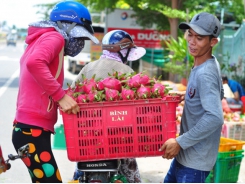Supports urged to maintain agricultural production during the COVID-19 pandemic

Agricultural production in southern provinces is facing difficulties due to the ongoing complicated development of the COVID-19 pandemic. To ensure food supply and food security, support policies are needed more than ever.
In the third quarter of this year, 19 southern provinces will see a total production of aquaculture products reach about 1.45 million tonnes. Photo: TL.
According to the Ministry of Agriculture and Rural Development’s Working Group 970 – a specialised group assigned to solve difficulties in agricultural production and consumption during the COVID-19 pandemic, southern provinces of Vietnam expects to harvest 900,000 ha of summer-autumn rice crop and 700,000 ha of autumn-winter rice crop with a production of 7.5 million tonnes. Of that, 3.5 million tonnes will for export.
From now to the end of this year, the production of 14 key fruits in the southern provinces is 3.2 million tonnes. About 3 million tonnes of fruits and vegetable will be exported by the end of this year.
About 450,000 tonnes of fruits is harvesting this month including 107,600 tonnes in southeastern provinces and 335,600 tonnes in Mekong Delta provinces.
In the third quarter of this year, 19 southern provinces will see a monthly production of aquaculture products reach about 483,000 tonnes, meeting the demand for export and domestic consumption.
The production of shrimp breeds and tra fish breeds could meet demand.
Farms in the southern provinces also produce about 141,000 tonnes of pork, 55,000 tonnes of chicken and 550 million eggs.
From now to the end of this year, in the 19 southern provinces, there are about 1.5 baby pigs, 43,800 breeding pigs and 3.9 million poultry. The production of poultry breeds and eggs are expected to meet demand in the last six months of this year.
In the last few days, the Working Group 970 worked with their counterparts in other ministries and agriculture departments of the 19 southern provinces to solve problems relating to the circulation of farming products and agricultural inputs during the social distancing.
Localities were praised for their efforts in solving problems, creating favourable conditions for agricultural production and circulation. Other localities in Vietnam could follow to avoid the disruption of production and consumption once social distancing is implemented.
Until August 5, the Working Group 970 received 778 applications to supply farming products from 200 vegetable suppliers, 192 fruit suppliers, 318 aquaculture product suppliers, 37 food suppliers and 31 ones with other goods.
Two forums on production-supply connections were organised in the south and the north. The agriculture ministry planned to regularly organise such forums to further connect producers and consumers, creating sustainable production-supply chains.
Supply might reduce sharply
According to the working group, the biggest concern now is the risk of production stagnation that could lead to the shortage of essential goods for domestic use and export in the coming time.
The supply of farming products for export in the last six months of this year might decrease sharply.
Despite huge demand, the ongoing complicated development of the COVID-19 pandemic in localities, especially those implementing social distancing, negatively affect agricultural production.
Many seafood processing plants are operating only half of their capacity. Crops are not given proper care, farmers are struggling to manage agricultural inputs and keep worries about disease development, all might result in insufficient supply of high-quality products for export.
Therefore, the southern provinces’ agriculture sector at the same ensure disease prevention and control and maintain production to avoid the disruption of food supply chains.
Once the food supply chains are disrupted, it will heavily affect farmers, workers and consumers as well as food processors and exporters. In short term, the disruption will negatively affect the food supply during the pandemic. In long term, it will affect national food security.
Supply of breeds and seeds
A sufficient supply of breeds and seeds is key in maintaining agricultural production and ensure food supply in the coming time.
Southern provinces have started the autumn-winter rice crop and second shrimp season this year.
To meet the increasing demand for shrimp breeds in the south, shrimp breeds are transporting from south-central provinces to southern provinces. However, the social distancing also poses difficulties for the breed supply.
Seeing a slowdown in consuming farming products like green dragon fruit, banana, pine apples, lemon, white-haired chickens, tra fish and shrimp, groups of farmers, co-operatives and enterprises are hesitating in continue investing in farming.
Thus, at this time, Government’s supports are necessary to maintain agricultural production.
The agriculture ministry suggested the Government have support policies relating to breeds and seeds, vaccination for agricultural workers and preferential loans.
To stimulate production, maintain food security and ensure the supply for export, the Working Group 970 recommended the Government implement the program of purchasing rice for national reserve.
The group also proposed the Government direct the State Bank of Vietnam to coordinate with the agriculture ministry in making a list of production facilities, agricultural products and food processing enterprises that are eligible to join the expanded loan quota programme.
Specifically, loans should be extended so that businesses have enough time to get money to repay while enterprises that buy farming products for reserve should be offered loans with preferential interest rates.
Enterprises also called for an electricity incentive so that they could further purchase farming products and invest in cold storage.
Related news
Tools

Phối trộn thức ăn chăn nuôi

Pha dung dịch thủy canh

Định mức cho tôm ăn

Phối trộn phân bón NPK

Xác định tỷ lệ tôm sống

Chuyển đổi đơn vị phân bón

Xác định công suất sục khí

Chuyển đổi đơn vị tôm

Tính diện tích nhà kính

Tính thể tích ao



 Businesses denounce the 'culprits' causing the drop in…
Businesses denounce the 'culprits' causing the drop in…  VIETFOOD connects summer-autumn rice consumption in Mekong delta
VIETFOOD connects summer-autumn rice consumption in Mekong delta